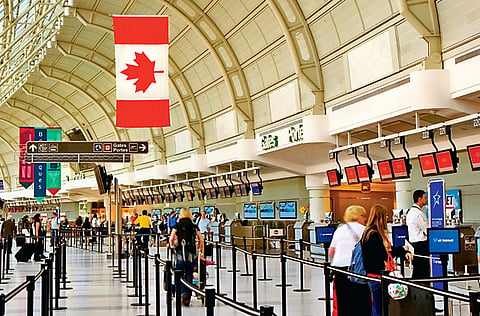Canada probes citizenship fraud in Middle East
Hundreds in the UAE and the Middle East may be stripped of Canadian citizenship

Dubai: Several hundred UAE residents who may have obtained Canadian citizenship fraudulently are to be stripped of their second passport, Gulf News has learnt.
Ottawa believes that some 3,100 citizens, most from the Middle East or Gulf countries, have wrongly been granted citizenship because they gave inaccurate or fraudulent information about residency.
“There are several hundred cases from the UAE,” a Gulf News source with knowledge of the investigation confirmed on Monday. “It’s a cause for concern and the recent reports that most of those are from the Middle East or Gulf countries are accurate.”
Officials at the Canadian embassy in Abu Dhabi are tight-lipped on the issue, referring media inquiries in Ottawa.
Jason Kenney, Canada’s Minister for Citizenship, Immigration and Multiculturalism, is determined to ensure those who have obtained Canadian citizenship fraudulently, are stripped of their new passports.
But that in itself may take years and choke up the federal court system in Canada if the cases area opposed.
The issue is residence fraud — applicants for Canadian citizenship are supposed to live in Canada as permanent residents for more than three years. But Ottawa believes that the system is open to widespread abuse, with many applicants continuing to work across the Middle East while claiming to live in Canada.
Ottawa thinks nearly 11,000 individuals are potentially implicated in lying to apply for citizenship or maintain permanent resident status.
“We are applying the full strength of Canadian law to those who have obtained citizenship fraudulently,” said Kenney in a release from his ministry. “Canadian citizenship is not for sale. We are taking action to strip citizenship and permanent residence status from people who don’t play by the rules and who lie or cheat to become a Canadian citizen.”
Citizenship and Immigration Canada has called in the Royal Canadian Mounted Police and Canada Border Services Agency to try and get to the bottom of the fraud, and it’s relying on help as well from Ottawa’s embassies and consular offices.
The investigation is also looking at some 5,000 people with permanent resident status in Canada who are known to be implicated in residence fraud.
The government has flagged these for additional scrutiny should they attempt to enter Canada or obtain citizenship.
The majority of these individuals are believed to be outside the country.
A common ruse is to use semi-legitimate agencies in Canada to lease apartments, pay electricity bills and keep money circulating in bank accounts — all to create the footprint of living in Canada to meet the residence requirements for citizenship.
In part, the investigation was spurred by many applicants having similar addresses, which aroused suspicion.
Permanent residents must reside in Canada for three years out of four years prior to applying for Canadian citizenship. To retain their status as permanent residents, they must be physically present in Canada for two out of five years with few exceptions.
The Mounties and the border agency have discovered cases where, for instance, a family of five may pay upwards of $25,000 (Dh90,000) to create the illusion of residence.
So far, Kenney’s ministry has helped federal officials remove or deny entry to more than 600 former permanent residents linked to the investigation. Another 500 applications for Canadian citizen applications have been rejected.
The clampdown has led to 1,800 applicants linked to the investigations abandoning their citizenship applications.
Part of the impetus for the investigation into fraudulently-obtained citizenships arose from the invasion of Israel into Lebanon against Hezbollah forces in 2007. The military operations led to widespread evacuations of foreign nations from Beirut. Canada leased ferries from Turkey to remove its citizens, but was surprised at the actual number of refugees who held both Canadian and Lebanese passports.



